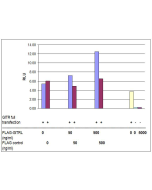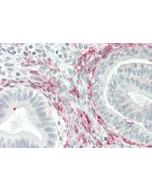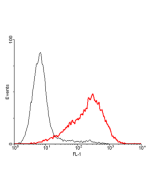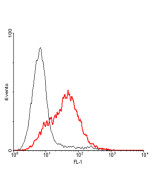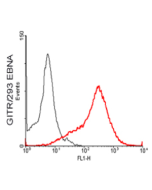Cookie Policy: This site uses cookies to improve your experience. You can find out more about our use of cookies in our Privacy Policy. By continuing to browse this site you agree to our use of cookies.
AdipoGen Life Sciences
GITRL, Soluble (human) (rec.) (His)

| Product Details | |
|---|---|
| Synonyms | Glucocorticoid-induced TNF Receptor Ligand; AITRL; Activation-inducible TNF-related Ligand; TNFSF18 |
| Product Type | Protein |
| Properties | |
| Source/Host | HEK 293 cells |
| Sequence |
The extracellular domain of human GITRL (aa 74-199) is fused at the C-terminus to a His-tag. |
| Crossreactivity | Human |
| MW | ~17kDa (SDS-PAGE) |
| Purity | ≥90% (SDS-PAGE) |
| Endotoxin Content | <0.06EU/μg purified protein (LAL test; Lonza). |
| Concentration |
After reconstitution: for 10µg size: 0.1mg/ml for 50µg size: 1 mg/ml |
| Reconstitution |
10µg size: Reconstitute with 100µl sterile water. 50µg size: Reconstitute with 50µl sterile water. |
| Accession Number | AAH69319.1 |
| Formulation | Lyophilized from 0.2μm-filtered solution in PBS. |
| Other Product Data |
NCBI link AAH69319.1: GITRL (human) |
| Shipping and Handling | |
| Shipping | BLUE ICE |
| Short Term Storage | +4°C |
| Long Term Storage | -20°C |
| Handling Advice |
After reconstitution, prepare aliquots and store at -20°C. Avoid freeze/thaw cycles. Centrifuge lyophilized vial before opening and reconstitution. PBS containing at least 0.1% BSA should be used for further dilutions. |
| Use/Stability |
Stable for at least 6 months after receipt when stored at -20°C. Working aliquots are stable for up to 3 months when stored at -20°C. |
| Documents | |
| MSDS |
 Download PDF Download PDF |
| Product Specification Sheet | |
| Datasheet |
 Download PDF Download PDF |
GITRL (Glucocorticoid-induced TNF receptor ligand) is expressed on dendritic cells (DC), monocytes, macrophages, B cells, activated T cells, endothelial cells, osteoclasts and various healthy non-lymphoid tissues (e.g. testis). GITRL is constitutively expressed and released as soluble form by solid tumors and various hematopoietic malignancies. GITRL causes differentiation of osteoclasts, activation of macrophages, but also alteration of carcinoma and leukemia cells and influences apoptosis. Binding to GITR is important in regulating T cell proliferation and TCR-mediated apoptosis. GITRL is implicated in development of autoimmune diseases and in the immune response against infectious pathogens and tumors.







